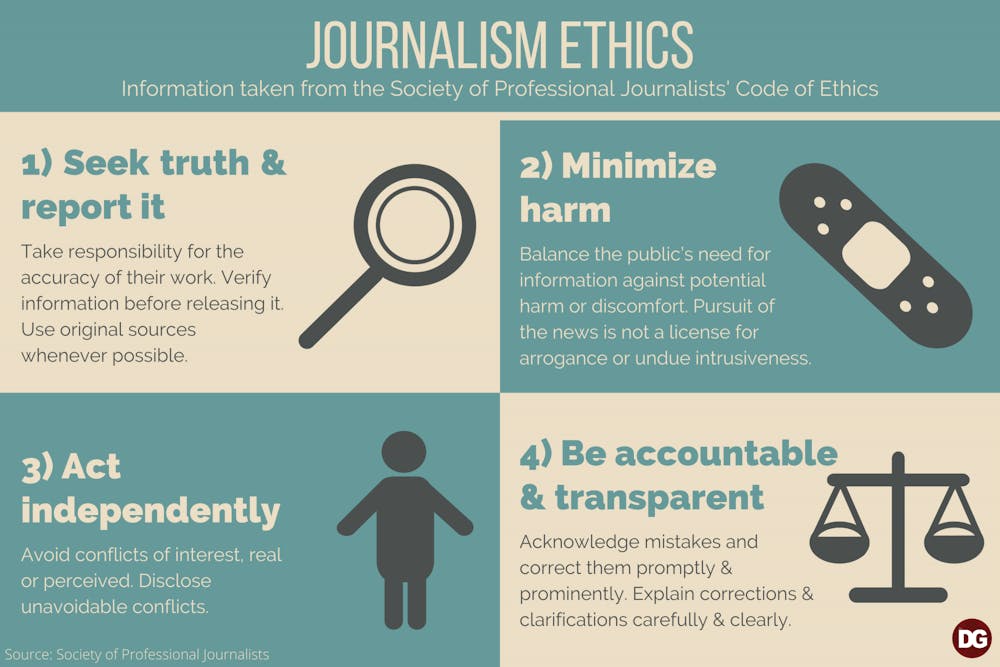Journalists need to follow a code of ethics to ensure validity and trust among their readers to get back to an America where the public trusts the media to deliver their information.
A journalist's primary job is to tell the truth. In 2012, 55% of Americans reported trusting in traditional media, according to trust barometer data shared with Axios. In 2021, that trust is at an all-time low with only 46% of Americans reporting trusting in the media. So how do we get this trust back, and why are readers so weary of journalists?
In 1923 the first code of ethics for journalists was approved by The American Society of Newspaper Editors (now known as the News Leaders Association), then The Society of Professional Journalists and finally the Associated Press. Following this code is voluntary and can't be enforced by the government, but is encouraged by individual news organizations.
The Society of Professional Journalists encourages journalists to follow these four main ideas:
- To seek truth and report it.
- Minimize the harm.
- Act independently.
- Be accountable.
These rules give journalists guidelines when faced with ethical decisions. When news stations don't enforce these rules, misinformation can be spread and this can be dangerous.
A problem in the media — potentially worsened by Trump-era politics — is media bias, which is defined by Lumen Learning as "the bias of journalists and news producers in the selection of events and stories that are reported, and how they are covered."
Two news companies that are notorious for political bias are CNN and Fox News. There is a difference between the two companies in what they report and how they write about the same topic.
When COVID-19 first took hold of the world, Fox News downplayed the virus, comforting its audience by claiming that warm weather would end it. Cohost Jesse Watters even went as far as to thank God for global warming, according to Literary Hub. If this news network was held to a higher standard and truthful reporting was enforced, millions of Americans wouldn't have been misled on the true nature of COVID-19.
CNN, on the other hand, continuously covered the virus in a way that portrayed its grave reality. As early as February 2020, a headline was posted by the news source that read: "Lawmakers react after coronavirus briefing 'I do not think we're prepared.'" The source paints COVID-19 as a clear problem. Those who watched CNN were 15% more likely than Fox News audiences to know that the virus came about naturally, according to Pew Research Center.
Another incident where the media misinformed the public, according to Eric P. Robinson, associate professor for media law and ethics, is during the U.S.'s involvement in Iraq and Afghanistan after 9/11, about Saddam Hussein having weapons of mass destruction.
"The media tends to believe the government without second-guessing things. It's only later that it comes along, 'Oh, we — well, there was no evidence of that,' or they weren't telling the truth," Robinson said.
Instead of an encouraged code of ethics, other countries have media councils. Media councils serve as a way for journalistic media to regulate journalistic conduct. It gives the opportunity for anyone to bring up any concerns to a specific media publication if they feel like a journalist is doing more harm than good. Multiple countries worldwide have media councils, including Kenya, Australia, France and the U.K.
This works well in other countries because it's not implemented through the government. The First Amendment allows freedom of speech and the press, so a national-scale ethics board telling journalists what they can't say might not go over well. But news stations can and should enforce codes of ethics in accordance with the First Amendment.
"The First Amendment is only involved when the government is telling you you can or can't say something. So a private organization can choose to do what it wants," Robinson said.
Media polarization hinders journalists from doing their job of telling the absolute truth and being transparent with their audience. A code of ethics board within news stations across the nation that follows these ideals would protect journalists when wanting to act independently from the government to serve the public. It would minimize harm by informing citizens of what they have a right to know, help with the media polarization in this country and put the public's trust back in the media.

